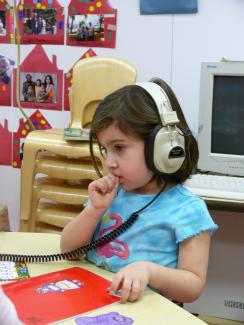
Reactions to the President’s Pre-K Speech and Proposal
February 15, 2013

The early childhood education (ECE) field is a-twitter with responses following President Obama’s announcement of federal investments in preschool for all during his State of the Union address on Tuesday night. Many have questions about how administration’s plan will approach preschool education. Will programs truly be of high quality? Will programs strike a balance between academics and play? What about programs for children younger than age 4? NIEER offered recommendations on the key components of a federal plan last week, but the White House plan is still surrounded by many more questions.
Answers to some of those questions may not be found for a while, but more details on the administration’s early education proposal were revealed this week. Early Thursday morning, the White House released a look at the preschool plan with this fact sheet. Later that day, President Obama made pre-K the focal point of a speech given in Decatur, Georgia. One thing that was apparent from the speech is that he has an impressive knowledge of the research and what high-quality really means for early care and education; video of that speech as well as a transcript are now available from the White House. Speaking on the return on investment of preschool education, President Obama said, “If you are looking for a good bang for your educational buck, this is it right here.” While in Decatur, the President also spent some time learning with students in a pre-K classroom.
Following the speech, Dr. Barnett released a statement, in which he noted that “early education can have substantive short- and long-term effects on cognitive and social-emotional development, as well as on school achievement, while reducing inequality, antisocial behavior, and even crime. So how can we choose not invest in it?” As the President did in his speech, it is important to attend to all of the research and not just studies that might support one view or another. This has not always been the case in responding to the proposed plan, particularly with some of the most negative responses.
For example, the Head Start Impact Study has been cited as evidence that pre-K doesn’t work. Yet, that study does not show that Head Start has no positive impacts, much less that high-quality preschool generally isn’t effective. The naysayers fail to acknowledge that Head Start teachers are paid about half what public school teachers earn, which is a serious impediment to hiring and retaining the best teachers. Nor do they mention the more positive research findings on Head Start from other studies or acknowledge that some Head Start centers are more effective than others.
Of course, the right way to address the question of what this proposal might accomplish is to ask what the research as a whole finds (and not just research here in the U.S.). This much is clear: on average there are substantial long-term effects; effects are larger if programs are well-designed to produce high-quality teaching; children from middle-income families benefit also if the programs are of high quality.
There are still plenty more details that will need to be revealed over the coming weeks as this proposal moves forward. For now, we at NIEER are pleased to see the conversation and debate on educating our youngest learners elevated to the national level.
– W. Steven Barnett, Director, NIEER
– Jen Fitzgerald, Public Information Officer, NIEER
– Megan Carolan, Policy Research Coordinator, NIEER
The Authors
W. Steven (Steve) Barnett is a Board of Governors Professor and the founder and Senior Co-Director of the National Institute for Early Education Research (NIEER) at Rutgers University. Dr. Barnett’s work primarily focuses on public policies regarding early childhood education, child care, and child development.
About NIEER
The National Institute for Early Education Research (NIEER) at the Graduate School of Education, Rutgers University, New Brunswick, NJ, conducts and disseminates independent research and analysis to inform early childhood education policy.

